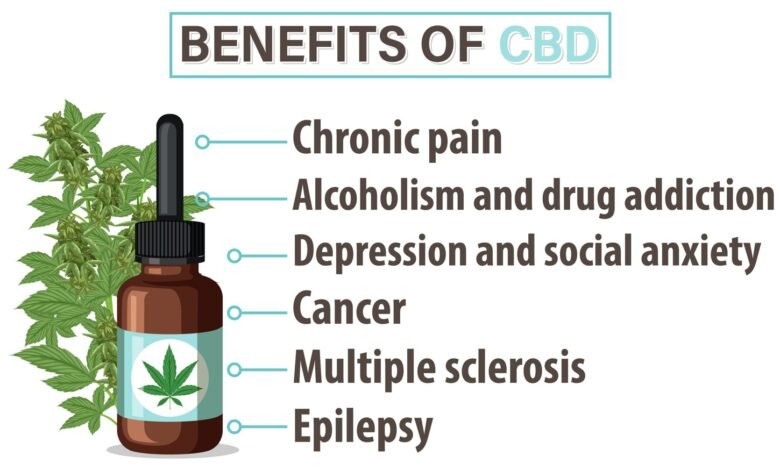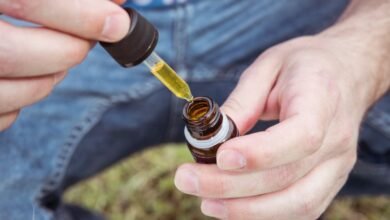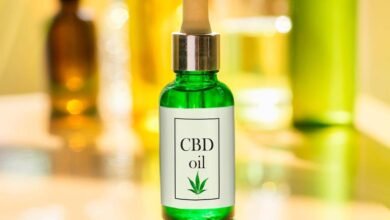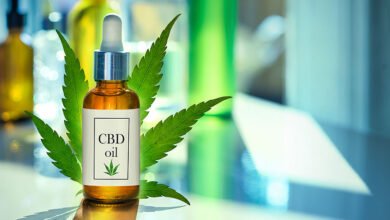13 Best Benefits of Using CBD in 2023


CBD, short for cannabidiol, is a compound found in the cannabis plant. Unlike THC, the psychoactive compound in cannabis that produces a “high,” CBD is non-intoxicating and has been shown to have numerous health benefits. In this article, we’ll explore the 13 best benefits of using CBD.
CBD is a natural compound found in the cannabis plant. Unlike THC, another well-known compound found in cannabis, CBD does not produce a “high.” Instead, it is believed to have numerous health benefits. In this article, we will explore some of the best benefits of using CBD.
Read More: CBD Tinctures: 5 Things You Need to Know Before Purchasing
Pain Relief

One of the most well-known benefits of CBD is its ability to relieve pain. CBD has been shown to reduce inflammation, which is often the cause of pain. It also interacts with receptors in the brain and immune system to reduce pain sensation.
Studies have found that CBD can be effective in treating chronic pain from conditions such as arthritis, multiple sclerosis, and neuropathic pain.
Anxiety and Depression Relief
Another major benefit of CBD is its ability to reduce anxiety and depression. CBD interacts with receptors in the brain that regulate mood and emotion and has been shown to reduce anxiety in both human and animal studies.
In a study of 24 people with social anxiety disorder, CBD was found to reduce anxiety and discomfort during a public speaking test. Another study found that CBD was effective in treating anxiety and insomnia in children with post-traumatic stress disorder (PTSD).
Cancer Treatment
CBD has also shown promise in fighting cancer. It has been found to have anti-tumor effects in animal and test-tube studies, and some studies have shown that CBD can induce cell death in human breast cancer cells.
CBD has also been found to reduce chemotherapy-induced nausea and vomiting, which can be a side effect of cancer treatment.
Acne Treatment
CBD has anti-inflammatory properties, which makes it a potential treatment for acne. Acne is often caused by inflammation in the skin, and studies have found that CBD can reduce sebum production and inflammation in the skin.
One study found that CBD was effective in treating acne in both human and animal studies and that it had fewer side effects than traditional acne medications.
Neuroprotective Properties
CBD has been found to have neuroprotective properties, which means that it can protect the brain and nervous system from damage. Studies have found that CBD can reduce inflammation and oxidative stress in the brain, which are often associated with neurodegenerative diseases such as Alzheimer’s and Parkinson’s.
Anti-Seizure Properties
CBD has been shown to have anti-seizure properties, particularly in children with epilepsy. In fact, the first FDA-approved CBD medication, Epidiolex, is used to treat seizures associated with two rare forms of epilepsy.
Studies have found that CBD can reduce the frequency and severity of seizures in both children and adults with epilepsy.
Diabetes Prevention
CBD has also been found to have the potential in preventing diabetes. In a study of mice with diabetes, CBD was found to reduce the incidence of diabetes by 56%.
CBD has been found to reduce inflammation and oxidative stress, which are both risk factors for diabetes. It has also been found to improve insulin sensitivity and reduce insulin resistance.
Cardiovascular Health
CBD has been found to have the potential in improving cardiovascular health. Studies have found that CBD can reduce blood pressure and improve blood flow in animals, and one study found that CBD can reduce resting blood pressure in human subjects.
CBD has also been found to reduce inflammation and oxidative stress in the cardiovascular system, which are both risk factors for heart disease.
Addiction Treatment
CBD has been found to have the potential in treating addiction. Studies have found that CBD can reduce drug-seeking behavior and withdrawal symptoms in animals, and one study found that CBD can reduce heroin-seeking behavior in humans.
CBD has also been found to have neuroprotective properties, which may help prevent the brain from becoming addicted to drugs.
Antipsychotic Effects
CBD has been found to have antipsychotic effects, which means that it can help treat psychotic disorders such as schizophrenia. Studies have found that CBD can reduce psychotic symptoms and improve cognitive function in people with schizophrenia.
CBD has also been found to have fewer side effects than traditional antipsychotic medications.
Anti-Inflammatory Properties
CBD has anti-inflammatory properties, which makes it a potential treatment for a wide range of conditions that involve inflammation. Inflammation is the body’s natural response to injury or infection, but chronic inflammation can lead to a variety of health problems.
Studies have found that CBD can reduce inflammation in conditions such as arthritis, multiple sclerosis, and irritable bowel syndrome.
Sleep Aid
CBD has been found to have the potential as a sleep aid. In a study of people with insomnia, CBD was found to improve sleep quality and reduce the time it takes to fall asleep.
CBD has also been found to reduce anxiety, which can be a cause of insomnia.
Muscle Relaxation
CBD has been found to have the potential as a muscle relaxant. Studies have found that CBD can reduce muscle spasms and improve muscle relaxation in conditions such as multiple sclerosis.
CBD has also been found to reduce inflammation, which can contribute to muscle pain and stiffness.
Conclusion
CBD has a wide range of potential health benefits, from pain relief and anxiety reduction to cancer treatment and neuroprotection. While more research is needed to fully understand the effects of CBD, the existing evidence suggests that it is a safe and effective treatment option for many conditions.
If you are considering using CBD for any of these purposes, it is important to talk to your doctor first. CBD can interact with certain medications and may not be safe for everyone.
Read More: Does Cannabidiol (CBD) Affect Your Driving Ability?
FAQs
Is CBD legal?
Yes, CBD is legal in many countries, including the United States and Canada. However, the legality of CBD can vary depending on where you live, so it is important to check your local laws before using CBD.
Will CBD get me high?
No, CBD is non-intoxicating and will not produce a “high.” However, some CBD products may contain trace amounts of THC, which is the psychoactive compound in cannabis that produces a high.
What is the best way to take CBD?
There are many ways to take CBD, including oral tinctures, capsules, edibles, and topical creams. The best way to take CBD depends on your individual needs and preferences.
Are there any side effects of CBD?
While CBD is generally considered safe, some people may experience side effects such as fatigue, dry mouth, and changes in appetite.
Can I take CBD with other medications?
CBD can interact with certain medications, so it is important to talk to your doctor before taking CBD if you are on any medications.







